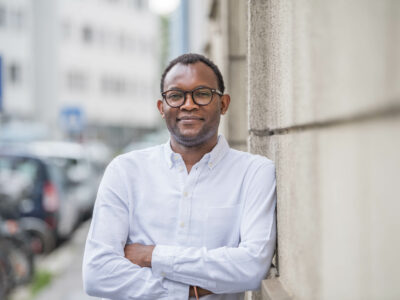
Juliana Mbengono:「如果男性及女性之間不存在有差異,那麼不會有人認為我是女性主義者;但有鑑於我們所經驗到的不平等,我覺得自己有義務要收回我的權利,而我透過的媒介是文學。」
Juliana Mbengono Elá Avomo是新聞系學生、幼稚園副園長,也是一個文學「新芽」(用西班牙語來說是Capullos Literarios,意即繭、花苞;在西班牙語口語中也有「混蛋」的意思)。她總是這樣自稱。2015年,她與兩名同學為赤道幾內亞詩人們創立了一個詩社,他們為詩社選用的名稱就是Capullos Literarios,因為他們都是初出茅廬的詩人,也是「還未被正式認可為作家。他們仍舊站在陰影處,但他們熱愛書寫,他們把一切所有灌注於書寫中,也將書寫用於每日生活當中。」
花苞的本質本就是含羞待放的,所以當他們開始綻放時,很難認出自己來。這是何以Juliana一直保持謙卑,儘管她已經贏過數個文學獎,寫過的2個劇本也曾經公演過,更是赤道幾內亞首都馬拉波Malabo「為文化瘋狂」組織([en] Crazy for Culture;[es] Locos Por Cultural,簡稱LPC)的統籌者。該組織將全赤道幾內亞不同領域的藝術家集合在一起。根據Juliana的說法,「為文化瘋狂」的目的是要「促進並創造出能夠讓年輕人能夠互動的空間,目標是在改善他們的藝術技巧並推進他們的社群領導能力。」

「為文化瘋狂」參與者;該組織的目的是要「促進並創造出能夠讓年輕人能夠互動的空間,目標是在改善他們的藝術技巧並推進他們的社群領導能力。」照片由「為文化瘋狂」提供,經授權使用。
這個組織涵蓋的藝術家社群數量並不固定。此刻,該組織由文學新芽、戲劇團體Speaking and Biyemyema、視覺藝術團體EG-Pencil以及Hangart、攝影團體Photos With Lyrics等所組成,外加許多獨立藝術家,像是進行肖像畫創作的Eusebio、Mariano Ebana Edu(也稱做Black Bey),還有進行歌曲創作的歌手及饒舌歌手Benjamín Ndong(Jamin Dogg)和Lil Jojo。
我們與Juliana談論了「為文化瘋狂」的活動、男女之間平權的努力,以及文化對於年輕人以及他們所生活環境的發展與成長的關鍵性。
全球之聲:你們有一項活動真的吸引了我的注意,那就是街道閱讀。當路人看到你們這一大群人時,他們的反應是什麼?
JMEA: The project “Reading Afternoons” is an initiative organized by Literary Buds to promote reading and writing among citizens. Many people think that reading is an activity reserved for educated people and so some people feel embarrassed when reading in public or simply consider it a waste of time. In fact, people say “if you want to hide something from a Guinean put it in a book.” We believe reading can produce changes in society, not only through the ways it can nourish the vocabulary of those who read but also the effect is has in many other areas of their lives.
This project is one of our great achievements because over time, along with LCP, we have been able to create a tradition in Malabo and Bata, the most important cities of Equatorial Guinea. Many people are already familiar with these literary festivities, they show interest and they are encouraged to read. That's how a good portion of the youth that participate regularly have been able to overcome the fear and nerves they used to feel when reading in public.
Juliana:「閱讀的午後」([en] Reading Afternoons;[es] Tardes de Lectura)這個計畫是由文學新芽所發起的,目的是要推動市民的閱讀與寫作習慣。許多人認為閱讀是專屬於受過教育族群的活動,所以有些人在大庭廣眾下閱讀會覺得有點尷尬,或單純認為這是在浪費時間。事實上,還有人說「如果你想要藏起某個東西不被幾內亞人知道,就把它放在書裡吧。」我們相信閱讀可以帶來社會的改變,不只是因為它能夠增進那些閱讀者的字彙,更是因為它會在閱讀者生命中的其他部分帶來改變。
這是我們最大的成果之一,因為隨著時間過去,在和「為文化瘋狂」的合作之下,我們以經在赤道幾內亞最重要的城市首都馬拉博(Malabo)以及巴塔(Bata)創立了一個傳統。許多人已經很熟悉這些文學嘉年華,他們對此流露出興趣,也得到鼓勵去閱讀。這就是何以一部分年輕人定期參與,就得以克服過去他們在大庭廣眾下閱讀時,所感受到的恐懼及忸怩。

由Juliana所領導的「為文化瘋狂」組織了許多在公共場域舉辦的文化活動。攝影:Lucía Mbomío,經授權使用。
全球之聲:「為文化瘋狂」的3名發言人當中有兩名是女性。這是為什麼呢?
JMEA: In Crazy for Culture (LPC), responsibilities are assigned based on the degree of interest and the commitment each one gives to the collective. Roles are not random nor are they based on gender.
Juliana:在「為文化瘋狂」中,各項任務的責任分派是依據對於活動的興趣,以及每個人能夠為組織投入的程度而定。角色的分派不是隨機的,也不是依據性別在分派的。
全球之聲:儘管這麼說,就算妳在妳的作品中處理過許多主題,女性的處境也是妳常書寫的。妳認為自己是個女性主義者嗎?在赤道幾內亞做為一個女性主義者,是怎樣的感覺呢?
JMEA: I wouldn't define myself as a feminist. I believe that everyone deserves to be respected and we wish to be treated the same as everyone else. If there were no differences between women and men then no one would think of me as a feminist, but given the inequalities that we experience I feel obliged to reclaim my rights and I do it through my literature.
To ask me whether or not I am a feminist is not a problem for me, but to identify myself as such in Guinea is another matter. Sometimes it bothers people who think feminism is the feminine equivalent to machismo. And lately I feel that labeling yourself a feminist has become a trend, particularly for those who think that being a feminist implies being intelligent, modern, and brave.
Juliana:我不會把我自己定義為一個女性主義者。我認為,每個人都應該要被尊重,而我們期望能夠與其他人一樣被對待。如果男性與女性之間沒有差別存在,那麼就不會有人認為我是一個女性主義者;但鑑於我們體驗到的不平等,我覺得自己有義務要取回我的權利,而我的媒介是文學。
對我而言,詢問我是否是個女性主義者並不是問題,但在赤道幾內亞要把我自己定義為這樣的身份,則是另一回事。有時那些認為女性主義等於女性版本父權的人,會因為這樣感到困擾。近來我感覺到,把自己貼上女性主義者的標籤已經成為一個趨勢,特別是那些認為成為女性主義者就暗示著妳既聰明、又時尚又勇敢的人來說,更是如此。
賦予女性力量的女性
全球之聲:在赤道幾內亞妳有那些女性人物榜樣?
JMEA: I look up to three or four women role models. The first one is Teodosia Mónica Angue Bivini, a stranger who became my mentor, boss, friend, and counselor. In Mónica, I find the example of a working woman who seems utopian, she is so entrepreneurial that she sees opportunities for employment and business where no one else imagines it. She is the founder and president of the non-profit organization IMGE (Women's Initiative for Education in Equatorial Guinea), and she is also the president of the association of Guinean members of YALI (Young African Leaders Initiative). She holds a degree in business administration with a specialization in human resources, and she works as the director of human resources in the Office of the Ombudsman, among many other things.
Juliana:有3到4個我崇拜的女性人物榜樣。第一個是Teodosia Mónica Angue Bivini,對我來說,她原本是一名陌生人,但後來卻成了我的導師、老闆、朋友及顧問。在Mónica身上,我找到了看似烏托邦式的職場女性典範;她是如此具有創業精神,能夠在雇員以及沒有其他人想像得到的生意上看到機會。她是非營利組織「赤道幾內亞女性教育協會」([en] Women's Initiative for Education in Equatorial Guinea;[es] Iniciativa de Mujeres por la Educación en Guinea Ecuatorial,簡稱IMGE)的創辦人暨主席;她也是年輕非洲領導者協會([en] Young African Leaders Initiative,簡稱YALI)赤道幾內亞分會的主席。她擁有企業行政的學位,主攻人力資源;她是赤道幾內亞申訴專員公署(Office of the Ombudsman)的人資主任。
JMEA: Also, there is Trifonia Melibea Obono Ntutumu, writer, journalist, gender researcher, and founder of the organization “We're Part of the World” (Somos Parte del Mundo, in Spanish), dedicated to defending the rights of non-heterosexual people;
Juliana:此外, Trifonia Melibea Obono Ntutumu也是另一個榜樣;她是作家、記者、性別研究者,也是「我們是世界一部分」([en] We're Part of the World;[es] Somos Parte del Mundo)的創辦者,該組織致力於捍衛非異性戀群體的權益;
JMEA: Meli [Trifonia Melibea] is so convinced in her principles that the wave of insults, negative opinions, disrespect and threats that fall on her constantly don't ever make her give up. She writes so much that there have been times when she has published two novels in less than five months, and her writing always centers around the situation of women and of non-heterosexual people in Equatorial Guinea. My new favorite novel is her book “The albino girl of money” (La albina del dinero, in Spanish), our lives are reflected in those pages.
Juliana:Meli是如此堅守她的原則,以至於儘管有種種汙辱、負面意見、不尊重和威脅針對她而來,都無法讓她放棄。她筆耕甚勤,有時在不到5個月內就出版兩本小說;她的作品總是以赤道幾內亞的女性及非異性戀群體為主題。我近期最愛的小說就是她的作品《金錢白化症女孩》([en] The albino gril of money;[es] La albina del dinero),書頁中反映了我們的生活。
JMEA: The third one is my aunt Melania, who sets the example on patience and solidarity. She took care of me and my little brothers when she didn't have enough to take care of herself. Even today she is still the umbrella that covers our enormous family when the rain comes down.
The last one is my mother. Her life and way of understanding things have influenced me greatly. Her tolerance has helped me to accept that no one deserves to be judged if they are not harming anyone and that I should never criticize others for what they say or do.
Juliana:第3個人是我的阿姨Melania,她立下了耐心以及堅定的典範。她在沒有足夠資源好能照料自己時,仍舊看照著我和我的弟弟們。直到今日,她依舊是在大雨來臨之時會遮蓋著我們這個大家庭的雨傘。
最後一人是我的母親。她的人生以及理解事物的方式,對我有深遠的影響。她的寬容幫助了我接受一件事:如果人們沒有傷害到任何人,就不該被評判;而我也不該因為他人的所言所為而批評他人。
全球之聲:你離你的夢想有多近?你離實現這些夢想有多遠的距離呢?
JMEA: In the future I would love to be a journalist, create a magazine, and launch a school for literary writing.
For now I am working on some projects in collaboration with IMEGE (Women's Initiative for Education in Equatorial Guinea), one of which is “A Night Among Writers” that will consist of workshops to exchange writing ideas and techniques among writers. We will also include sessions to teach public speaking and how to launch. Another one is “Youth Date,” a radio program dedicated to young Equatorial Guineans and to entrepreneurs.
I trust that I will be able to reach many of my dreams, that's one of the things that makes life seem so wonderful to me.
Juliana:未來我想當一名記者,創辦一本雜誌,並開辦一間文學寫作學校。
現在,我正與「赤道幾內亞女性教育協會」合作一些計畫,其中一個是「作家之夜」([en] A Night Among Writers;[es] Una noche entre escritores),這個活動當中會有多個工作坊讓作家們交換寫作創意以及技巧。我們會加入一些教學活動,主題包括公開演說以及如何開創新事業。另一個計畫是「青年約會」([en] Youth Date;[es] Cita Juvenil),這是一個廣播節目,以赤道幾內亞年輕人以及創業者為目標收聽人群。
我相信我有辦法實現我的許多夢想,這是對我而言讓生命如此美好的其中一件事。






